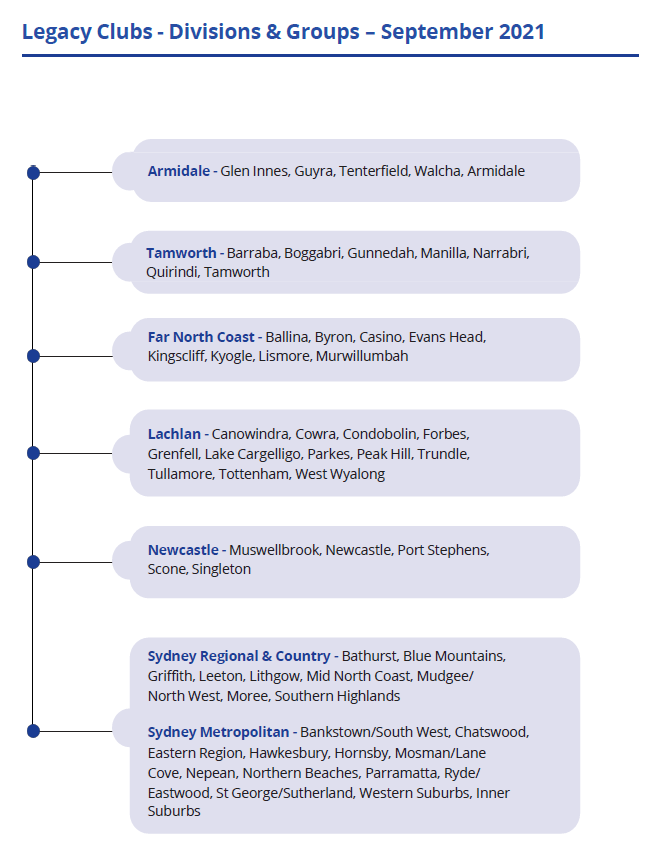What is Legacy Club Services (LCS)
Legacy Club Services (LCS) is a service company incorporated under the Corporations Act 2001. It is owned and controlled by its members, all of whom are Legatees. LCS is the latest name of a company that has been in existence for nearly eighty years, having originally been incorporated in 1942 as The Sydney Legacy War Orphans Fund.
A number of Legacy clubs utilise the corporate and support services of LCS to assist them in continuing to look after the dependants of veterans who have given their lives or health, as a result of their service.
The clubs remain completely independent with an individual Charter from Legacy Australia and are responsible for their own governance and operations. They use the shared services of LCS to help them in fulfilling their obligations under the Legacy Charter as sovereign clubs.
LCS itself is a recognised member of the wider Legacy family and has been granted Associated Entity status by Legacy Australia. LCS is not a Legacy club and does not hold a Legacy Charter.
LCS is registered as a charity with the Australian Charities and Not-for-profits Commission (ACNC) and holds Deductible Gift Recipient (DGR) status with the Australian Taxation Office. This enables the Company to raise and invest funds on behalf of the clubs.
History and background
-
The genesis of LCS comes from a proposal and submission presented by Far North Coast Legacy (FNC) to a NSW State Conference in 2009. The proposal was considered at the 2013 and 2014 Legacy conferences and involved consolidating club resources into a single service delivery company.
-
The concept was adopted by Sydney Legacy in 2015. Sydney Legacy agreed to make its assets available to other NSW Legacy clubs that wished to utilise the shared services of the proposed company.
-
The Company was a way of reducing individual clubs’ administrative overheads, avoiding duplication and enhancing the delivery of effective services to Legacy beneficiaries.
-
LCS is also a way for clubs facing administrative or other challenges to continue operating as clubs in their local areas, and providing the necessary and important support that Legacy gives to beneficiaries.

The underlying purpose of LCS is to support and enable Legacy clubs to continue to provide a high-quality level of service to their beneficiaries.
This purpose is achieved by LCS assisting clubs by undertaking management of their consolidated financial resources and accounts, fundraising, staff, ICT systems, advocacy and claims (and any subsequent appeals) for beneficiary pensions.
The Board of LCS is responsible for the governance and compliance obligations of the Company.
LCS adds value as a service company by helping clubs provide for their beneficiaries; relieving Legatees from administrative roles so they can provide better services for beneficiaries and maintaining the autonomy and identity of local Legacy clubs within their communities.

LCS provides a suite of services that support Legacy clubs and their operations. These include:
-
Fundraising, Marketing and Communications (FMC) Team: Provides practical assistance and guidance to each club, especially in support of its community fundraising efforts;
-
Finance Team: Manages centralised accounts, oversees LCS investments and insurance, financial reports and general accounting support;
-
Information and Communication Technology (ICT) Team: Provides and manages all ICT systems including the Customer Relationship Management system (CRM), Legatee portal, staff intranet, computers/laptops, data, video-conferencing, audio, telecommunications and network resources;
-
Compensation and Advocacy Team: Assists Legatees and beneficiaries with lodging claims for pension benefits and managing any appeals;
-
Community Service Workers (CSWs): Provision of professional community service staff to assist Legatees and their beneficiaries. The support provided is tailored to meet the needs of each clubs’ beneficiaries;
-
Legatee Support Team: Provision of support for Legatees including administrative and clerical support, records management, archiving and maintaining CRM records;
-
Family Support Team: Provision of support to the families of 4th Generation families (4G);
-
Policies and Procedures: Assisting clubs and Legatees with any policies and procedures they require to suit local needs. LCS has its own policies and procedures to govern its operations and protect the interests of clubs and their beneficiaries;
-
Human Resources: Assisting clubs and Legatees with all aspects of staff management including recruitment, career development, workplace health and safety, training (including Legatee training) and the recruitment and management of volunteers.

LCS has a number of strategic objectives including:
-
the delivery of high-quality service that is relevant, sustainable and responsive, to meet the needs of Legacy clubs and their beneficiaries;
-
assisting Legacy clubs and Legatees in providing excellent care and support to their beneficiaries;
-
the provision of effective leadership by providing good governance and undertaking robust planning and reporting, to support LCS operations and Legacy clubs;
-
the recruitment and training of professional staff and volunteers, that are guided by the Legacy culture of service and excellence;
-
ensuring the organisational capability to support LCS operations is sustained through effective financial management and the application of relevant technologies;
-
ensuring marketing, fundraising and raised community awareness generates sufficient funds from a variety of revenue streams for LCS, to enable LCS to be self-generating (income meets or exceeds outgoings) and to support Legacy club operations; and
-
ensuring communication processes allow effective engagement with relevant stakeholders and increasing community awareness of Legacy clubs and their work in supporting their beneficiaries.

There are currently 6 Legacy clubs which utilise all the services of LCS – Armidale, Far North Coast, Lachlan, Newcastle, Sydney and Tamworth.
Clubs choose to utilise LCS services for the many advantages the services provide, including:
-
clubs continue to operate as independent, self-governing clubs under the control of their own Club Management Committee, which manages their club and supports their Legatees;
-
clubs are responsible for their own local governance, whilst not having to register with or report to the ACNC;
-
Legatees have more time to care for their beneficiaries and local fundraising by not having to undertake all of the administrative functions involved in operating their club, or the additional burden of operating a legal entity (company).
-
clubs can consolidate their operational resources in LCS (e.g. financial investments, assets including property and facilities, staff and ICT) in one company, thereby maximising investment income and reducing duplication and costs;
-
clubs continue to develop their own budget to suit local needs, with access to consolidated financial resources to support their local operational plans and supplement their fundraising;
-
Legatees are encouraged to become members of LCS and help operate the Company in the best interests of their clubs and beneficiaries; and
-
assistance in ‘keeping the promise’.
The structure and operations of each club in terms of divisions, contact groups, panels and committees is a matter for the individual Club Management Committee to determine. Club presidents are responsible for the day-to-day operations of their respective club.


 HISTORY OF LEGACY - Click here to view a newly digitised file covering the first 50 years of Legacy.
HISTORY OF LEGACY - Click here to view a newly digitised file covering the first 50 years of Legacy.